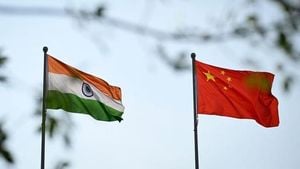Chicago, a city long known for its proud immigrant heritage and decades-old sanctuary status, now finds itself at the epicenter of a fierce national clash over immigration enforcement. On August 30, 2025, Democratic Mayor Brandon Johnson signed an executive order instructing Chicago’s police and city agencies to refuse cooperation with federal immigration authorities, a move that has escalated tensions with President Donald Trump’s administration as it prepares for a sweeping crackdown in major Democratic-run cities.
According to CNN, Johnson’s order is unambiguous: Chicago law enforcement will not “collaborate with federal agents on joint law enforcement patrols, arrest operations, or other law enforcement duties including civil immigration enforcement.” The order also urges officers to refrain from wearing masks, to use body cameras, and to identify themselves clearly with names and badge numbers. The mayor’s directive comes as federal officials revealed plans to deploy U.S. Immigration and Customs Enforcement (ICE), Customs and Border Protection (CBP), and other agencies to Chicago for a 30-day operation, possibly beginning as soon as September 5.
“We may see militarized immigration enforcement. We may also see National Guard troops. We may even see active duty military and armed vehicles in our streets,” Johnson warned before signing the order, as reported by CNN. “We have not called for this. Our people have not asked for this, but nevertheless, we find ourselves having to respond to this.” His executive order further directs city officials to “pursue all available legal and legislative avenues to resist coordinated efforts from the federal government.”
Chicago’s tough stance reflects a broader standoff between the city’s progressive leadership and an emboldened Trump administration. As the Associated Press reported, the White House-ordered operation in Chicago is expected to focus exclusively on immigration enforcement, not the broader crime-fighting missions that have characterized previous federal interventions in cities like Washington, D.C. The Trump administration has even requested use of the Naval Station Great Lakes, north of Chicago, to support the effort.
Chicago’s sanctuary city policies—among the strongest in the nation—have long put the city and the state of Illinois at odds with Trump’s hardline approach. The city’s leadership, including Governor J.B. Pritzker, has repeatedly clashed with federal authorities over the refusal to cooperate with ICE detainer requests and other immigration enforcement measures. Trump, for his part, has not minced words, repeatedly referring to Chicago as a “hellhole” and a “war zone.” On his Truth Social platform, he lambasted Governor Pritzker: “Panic stricken Governor Pritzker says that crime is under control, when in fact it is just the opposite. He is an incompetent Governor who should call me for HELP.”
Mayor Johnson, however, has dismissed Trump’s rhetoric, acknowledging a spike in crime during the Covid-19 pandemic but touting recent progress: “historic progress driving down homicides by more than 30 percent and shootings by almost 40 percent in the last year alone.” He criticized the president’s approach as “uncoordinated, uncalled for, and unsound,” warning it “has the potential to inflame tensions between residents and law enforcement.”
But Chicago is hardly alone in feeling the effects of the Trump administration’s aggressive immigration policies. Just days before Johnson’s executive order, a harrowing incident unfolded in Washington state, where Customs and Border Patrol agents interrupted two crews of firefighters battling the Bear Gulch wildfire. According to the Seattle Times, agents lined up the firefighters, checked their IDs, and arrested multiple men—preventing them from continuing their life-saving work.
Eyewitness accounts described firefighters in full gear sitting on logs in front of federal officers. Some were dismissed to their vehicles, while others were arrested on the spot. One firefighter, denied the chance to say goodbye to detained colleagues, recounted to the Seattle Times, “I asked them if his [family] can say goodbye to him because they’re family, and they’re just ripping them away. And this is what he said: ‘You need to get the [expletive] out of here. I’m gonna make you leave.’”
The incident, which occurred as Washington battled its largest active wildfire, has sparked outrage and renewed scrutiny of federal tactics. Images shared from the scene showed a CBP vehicle parked nearby and officers in “Police” vests arresting and restraining firefighters. The episode, critics argue, exemplifies the Trump administration’s uncompromising approach—one that, in their view, prioritizes immigration enforcement over public safety and humanitarian considerations.
Such stories are not isolated. Across the country, federal agents have detained immigrants attending legal proceedings, separated families, and, as reported by the Seattle Times, “stationed at New York City’s 26 Federal Plaza, where immigrants must come to manage paperwork and other processing requirements, have repeatedly arrested individuals who have come for the explicit purpose of filing the proper forms or attending hearings.” In May, ICE agents arrested a mother, her daughter, and her six-year-old son suffering from leukemia after they presented for an asylum hearing in Los Angeles. The family was separated and sent to a detention facility in Texas before being returned to Los Angeles in July.
For many observers, these events are not just about immigration laws or border security, but about the very definition of American identity and belonging. As the Seattle Times analysis put it, “An action like this, against men risking their lives to protect American citizens and American nature, sends a clear message: nothing you do will ever be enough to truly belong here.” The article continues, “If being a firefighter, essentially a kind of everyday superhero in modern life, is not sufficient to earn you a place in American society, what is?”
The Trump administration’s defenders argue that strict enforcement is necessary to uphold the rule of law and protect American jobs and safety. They claim sanctuary policies undermine federal authority and create havens for crime. Yet, critics counter that the administration’s tactics—raids, family separations, and high-profile arrests—are inhumane and erode the nation’s founding ideals of pluralism and opportunity.
Beyond policy, the debate has become deeply personal for those affected. Firefighters, civil servants, and ordinary families find themselves at the center of a struggle over who gets to call America home and under what conditions. The federal government, as described by the Seattle Times, is “being remade in the images of Trump and figures like Stephen Miller and Pete Hegseth. Dutiful civil servants are purged and replaced with ideologues and lackeys, and others are cowed into towing the new party line.”
As Chicago braces for the coming federal operation, the city’s leadership is digging in for a fight that is as much about local autonomy and public trust as it is about immigration enforcement. The outcome may well set precedents for other cities and states grappling with similar dilemmas. For now, the streets of Chicago—and the forests of Washington—remain the front lines in a national reckoning over law, justice, and the meaning of American citizenship.




